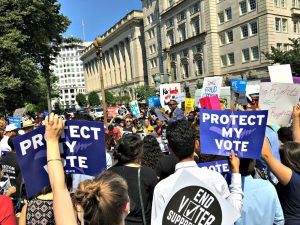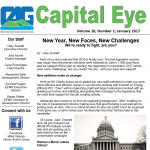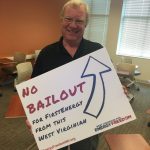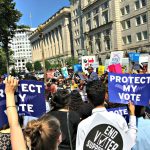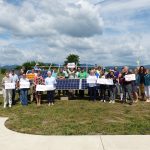- Like
- Digg
- Del
- Tumblr
- VKontakte
- Buffer
- Love This
- Odnoklassniki
- Meneame
- Blogger
- Amazon
- Yahoo Mail
- Gmail
- AOL
- Newsvine
- HackerNews
- Evernote
- MySpace
- Mail.ru
- Viadeo
- Line
- Comments
- Yummly
- SMS
- Viber
- Telegram
- Subscribe
- Skype
- Facebook Messenger
- Kakao
- LiveJournal
- Yammer
- Edgar
- Fintel
- Mix
- Instapaper
- Copy Link
ACLU of WV, WV CAG urge state officials not to cooperate
by Julie Archer & Eli Baumwell
The American Civil Liberties Union of WV (ACLU-WV) and the WV Citizen Action Group (WV-CAG) have serious concerns about the Presidential Election Integrity Commission and its attempt to collect personal information on every U.S. voter. This Commission has no credibility and is a pretext for voter suppression.
American elections need to be safe, fair, and transparent. We all agree that voter rolls should be accurate and up-to-date. However, the actions of the Commission thus far, and the record of the official tasked with leading it, inspire zero confidence that this is the goal. A number of states have refused to share information with the Commission fearing that participation will legitimize the false and debunked claims of massive voter fraud made by President Trump. We share their concerns that the Commission is not genuinely seeking to preserve and promote voter participation and election integrity but is unjustifiably and inappropriately collecting information about voters in order to suppress the vote.
The genesis of the Commission is based in pure fantasy; it was established to support the President’s outlandish claim that three to five million non-citizens voted in the recent election. Despite the tweets of the President, the incidence of voter fraud has been studied numerous times and the consensus from credible research and investigation is that illegal voting is virtually nonexistent. For example, the George W. Bush administration conducted an exhaustive five year study into voter fraud and found virtually no evidence of organized fraud in the United States. Similarly, a Loyola University study showed that between 2000 and 2014 there was approximately one credible instance of voter impersonation for every 32 million ballots cast. To purport to study voter fraud yet again under the guise of election integrity is a distraction, as well as a waste of time and resources that could be used to address the real threats to our democracy.
The Commission is led by Kansas Secretary of State Kris Kobach, a man who has made a career of voter suppression. Secretary Kobach was recently rebuked by the U.S. Court of Appeals for the Tenth Circuit, in a unanimous opinion by George W. Bush-appointee Jerome Holmes, for the “mass denial of a fundamental constitutional right,” because he disenfranchised 18,000 motor-voter applicants in Kansas. The Court found that Kobach’s assertions about widespread non-citizen voting were “pure speculation.” And just a few weeks ago, a federal magistrate judge fined Secretary Kobach $1,000 for “deceptive conduct and lack of candor,” and for making “patently misleading representations to the court” in a voting rights case.
Secretary Kobach has a history of using information such as that requested by the Commission to make wildly exaggerated claims about voter fraud. In Kansas, he has attempted to use the Interstate Voter Registration Crosscheck Program as a means of finding examples of voter fraud. However, the Crosscheck program generates 200 false positives for every instance of double voting. If Secretary Kobach used the same system to identify voter fraud nationally, there is little doubt that many West Virginians would falsely be accused of voter fraud.
In fact, the Commission confirmed that it intends to run the state voter rolls it has requested against various federal databases, a plan experts say is likely to create thousands of false positives that could distort the potential for fraud and increase the likelihood that voters will be incorrectly purged. Mr. Kobach is obsessed with trying to identify voter fraud and finds it in places where it doesn’t exist.
We also have significant concerns regarding the privacy of individual West Virginians’ voter information requested by the Commission. Secretary of State Mac Warner said in his response to the Commission that a request for voter registration information will be considered if the Commission submits the documentation and the fees required to obtain a copy of the list, and that his office will not release personal information to the Presidential Commission, even upon request. Although some sensitive information like Social Security numbers, phone numbers, email addresses, driver’s license numbers and other personal information will not be released, disclosure of the other requested voting information still poses potential risk for the state’s residents because the Commission will make the information public without the safeguards required by West Virginia law. The Commission was established under the Federal Advisory Committee Act (FACA), which requires that “records, reports, … or other documents” submitted to the Commission be made available for public inspection. West Virginia law prohibits voter registration information to be used “for commercial or charitable solicitations or advertising, sold or reproduced for resale.” Given the FACA requirement, it would be virtually impossible to ensure that these limitations on use of West Virginia’s voter file would be preserved by the Commission.
This waste of government resources and invasion of our privacy is all being done in an attempt to suppress people’s right to vote. West Virginians and our state officials should refuse to cooperate in any way with this sham commission.
Julie Archer is WV CAG’s Program Manager. Eli Baumwell is Policy Director for the ACLU of WV.

